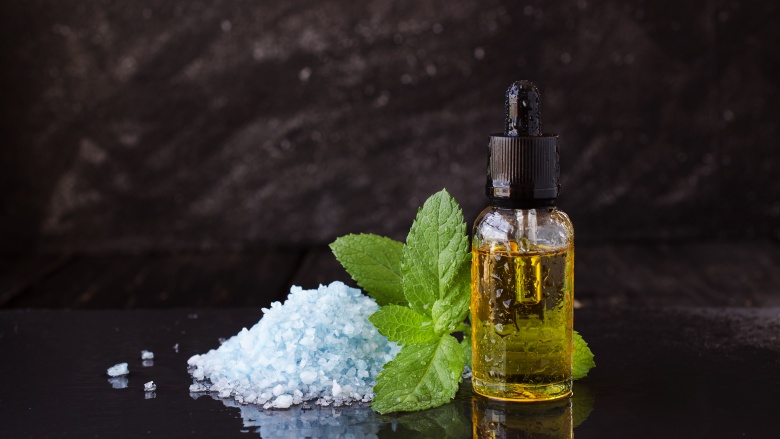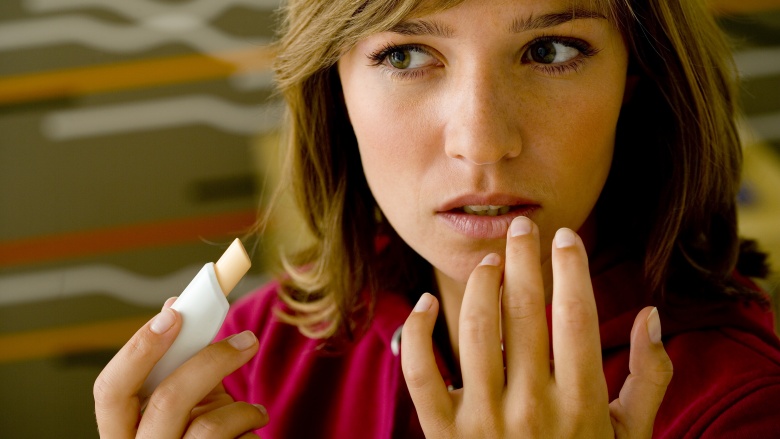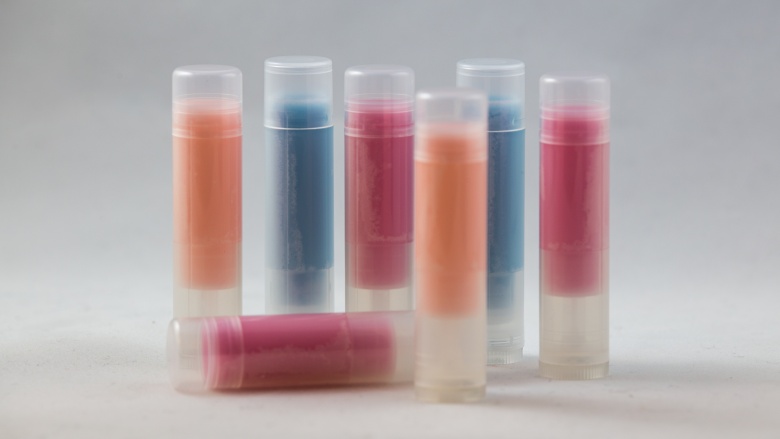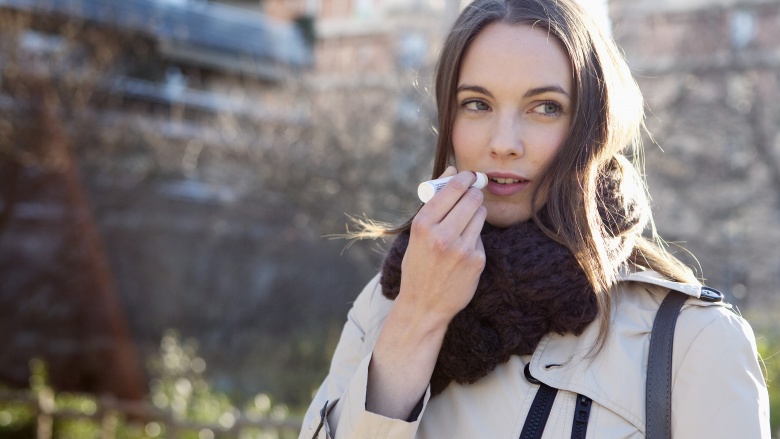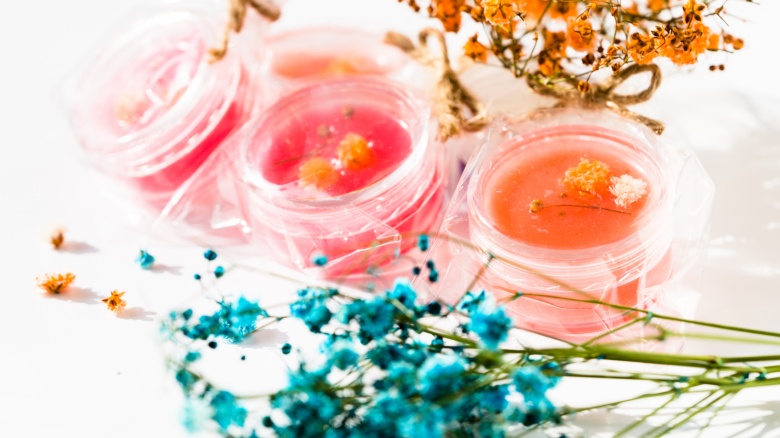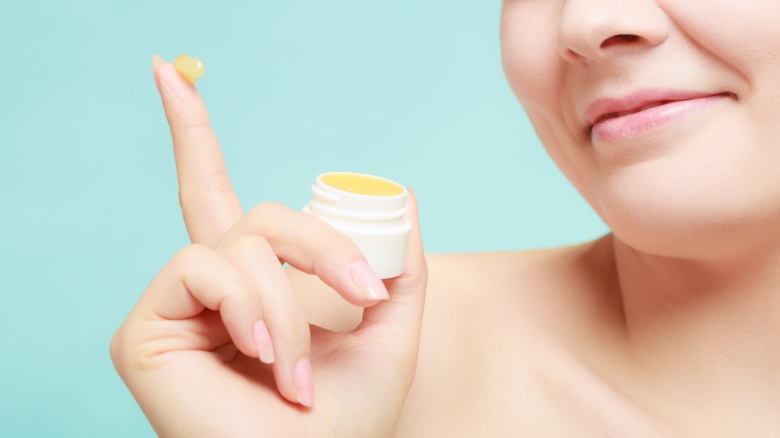The Real Reason You Should Stop Using Lip Balm
We all know people who always have a tube of lip balm on them. They might put it on without even realizing it, after every sip from their cup of coffee or a dozen times during an hour-long meeting. For some, it's more than just convenient relief from the uncomfortable symptoms of chapped lips. It's an outright addiction, and it can lead to a dependency that's incredibly hard to break. For others who aren't so dependent, using lip balm might be doing more damage to your lips than good. There's no denying the winter months can be hard on your lips, though, so why should you really stop buying these commercial brands and what do you do instead?
Some ingredients do more damage than good
There's an insane number of options out there when it comes to choosing a lip balm, and it's hard to resist ones that have a scent that's not the least bit medicinal. (Strawberry ChapStick, anyone?) But according to a dermatologist from the American Academy of Dermatology, some of them have ingredients that could be doing more harm than good... especially some of your tried-and-true favorites.
Diane Madfes, MD, says added fragrances present some of the biggest problems to regular users. Some, particularly cinnamon-based additives, can irritate already dry and sore lips. You know how much it burns when you eat something spicy or tangy when your lips are dry and cracked, and these additives can be just as painful. Surprisingly, she also targets menthol as one of the other big problems. Even though we associate the distinctive, cool feeling of menthol with healing, it can actually make lips more sensitive to the elements you're trying to protect them from. Vitamin E can be another deceptive ingredient, too. Like menthol, we associate vitamin E with health and healing. That's true, but when it's used topically, some people have developed an allergic reaction to it. That's not something you want to have to deal with, either, and it's easier just to go without.
The bad stuff
When Motherboard compiled a list of the most damaging ingredients found in various types of lip balm, they looked at what a whole bunch of dermatologists recommended you stay away from. In addition to the vitamin E, menthol and artificial flavors we talked about, they also named camphor, wax, phenol, and alcohols as also potentially damaging.
Take a look at the ingredient list on ChapStick, one of the most well-know brands of lip balm. What's in a tube of ChapStick? Camphor, carnauba wax, cetyl alcohol, and oleyl alcohol. The skin that covers your lips is particularly thin and delicate. Those particular chemicals have been linked with causing damage, dryness and peeling, and those are the exact things you're trying to prevent. Chap Stick isn't alone in having some less-than-stellar ingredients, and if you take a look at the ingredient lists of other types of lip balm you'll find some similar things. Unfortunately, that means that your favorite lip balm isn't as good for you as you might think, and we're not even finished yet.
How addictive is it?
If you're not one of these people, you might know someone who is. They always have sticks of lip balm in a purse or tucked into a pocket, there's a couple on the desk, a few in the car, and even more scattered around the house. Some might even joke about being addicted. For others, it can be a serious matter. Urban legends might claim there's something addictive in lip balm that keeps you applying it over and over again, so what's the real deal? The truth is, it's not actually, physically addictive. Lip balms work by sealing moisture into your lips, creating a protective barrier between your lips and the elements. The Guardian found that the ingredients in lip balms don't create a physical dependency, but when they spoke to representatives from the national charity OCD Action, they did find there's something else at work here.
OCD Action director Joel Rose says it's the act of putting on lip balm that's actually addictive. It can become a mild form of OCD and most of the time, it's pretty harmless. Like any other kind of repetitive action that's done over and over again, it can get to the point where it gets in the way of daily life and in that case, you might end up needing help breaking your addiction. Part of what makes it such a widespread issue is that it's a soothing mechanism, something easy that we can do that we know makes us feel better and even look better. While he says that "addiction" might be too strong a word to accurately describe what's going on when someone needs to apply lip balm dozens of times a day, he still says there's definitely times when people should seek help.
When it interferes with everyday life
According to Dr. Daniel E. Mattila, M. Div., LCSW-R, the problem can definitely get to the point where it interferes with daily functioning. He agrees it's not so much an addiction as it is a compulsion, but he also notes there are a lot of the same things going on. It's not just about the feeling that using it creates, but it's also about what happens when you don't have it. Some people find themselves distressed, uncomfortable and even panicked if they don't have their lip balm, and that's when you know it's becoming a problem. He's seen some try to hide or justify their need, and all those things are painfully similar to addiction.
Refinery 29 took a look at one woman's lip balm addiction. Kerri Miller reported hiding her repeated lip balm applications from her coworkers, and that she felt she needed to keep finding more and more ways to discreetly apply it. Not having it led to licking her lips and chewing her mouth until it bled, sending her running to the store in the middle of a workday to pick up another tube. Hers is an extreme case, but Mattila says it can be an absolutely real problem.
It's incredibly easy to make your own
There are some things that Motherboard's pool of dermatologists suggested were actually good for your lips, and that included things like beeswax and cocoa butter. But scouring any drug store shelf for a pure, commercially produced product is a challenge and a half. Fortunately, it's so easy to make your own lip balm that there's absolutely no reason to keep buying it.
The Nourished Life has this great recipe for making an incredibly flexible base for an all-natural, beeswax-based lip balm. The basic recipe only calls for coconut oil (or shea butter or olive oil) and beeswax, with absolutely none of the impossible-to-pronounce ingredients that are listed on the side of most other commercial lip balms. There's plenty of room to experiment, too, adding natural colors and flavors with dyes like beetroot and your favorite essential oils. If you're the crafty sort, there's so many options for fun packaging (an Altoids container, maybe?) and, if you're going more for style than practicality, you can also add things like edible glitter or bold colors. There's literally no end to the projects, and they're easy enough to do at the spur of a movement on a rainy afternoon. They're also great to hand out as thoughtful little gifts for anyone who needs a smile and a pick-me-up, because who wouldn't love that?
So, give that store-bought lip balm a miss!
Now, you know. The uncomfortable feeling of dry, chapped lips is an inconvenience that can last months, especially if you live in drier, colder areas. Pick up the wrong thing at the grocery store and you might be causing more problems than you're solving... and that's the big reason why you need to stop buying lip balms, and just start making your own. There are a few other little tips and tricks you might want to try, too. Dr. Jessica Wu from the University of Southern California's School of Medicine gives some great advice on how to help prevent dry, chapped lips from becoming a problem in the first place. She says that one thing that's incredibly important to remember is to stay hydrated, and that drinking enough water will make a world of difference not just for your lips, but your skin in general.
She also suggests making sure your diet is rich in omega-3 fatty acids, which helps keep the oil levels of your skin and lips naturally balanced. Using a humidifier will also help your skin stay soft, especially during the winter months. Having the heat on all the time can dry out the air and that, in turn, takes a toll on your lips and skin. Run that at night and put on some of your homemade lip balm before you go to sleep, and you'll be surprised at the difference it makes by morning.

